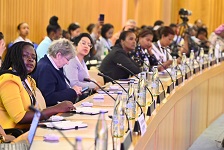Digital technologies also contribute between 1.4% to 5.9% of global greenhouse gas emissions.
This is indicated at the 17th Internet Governance Forum opened in Addis Ababa, Ethiopia this week. During the high-level leaders’ session on digital trust and security, the participants highlighted the need to step up efforts to advance green standards and manage the sustainable disposal of e-waste.
They also stressed the importance of the multi-stakeholder community in implementing norms to build digital trust and security.
It is stated that as of September 2022, there were about 97 significant cyberattacks against worldwide government agencies, defense, companies, or economic crimes resulting in losses of more than a million dollars.
With the safety and security of the Internet under threat, participants at the High-Level Leaders Session on Digital Trust and Security called for accelerated efforts to achieve a safer, more secure digital world.
Safety and security of the Internet extends beyond cyberattacks. The spread of misinformation and disinformation as well as increased online violence and hate speech has put the benefits of the Internet in jeopardy. Reducing carbon emissions in digital activities and consumption to ensure environmental sustainability is also a critical element.
During the session on ‘online gendered disinformation from a global south perspective’, the participants in the session stressed the importance of regulatory frameworks to protect women online.
They also stressed the need for online platforms to be more proactive in tackling online discrimination. The annual UN Commission on the Status of Women was also recognized as a key platform for addressing online gendered disinformation.
It is indicated that while women’s political participation has increased — for example, women today occupy 26.1% of parliamentary seats globally, compared to 13.1% in 2000 — women are still underrepresented at all levels of decision-making worldwide.
The participants indicated that this gender inequality is exacerbated by the online gender-based violence that women face in the public sphere. For the Global South, this translates into a staggering spike in gendered disinformation during election time.
